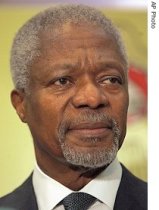2007年VOA标准英语-Kofi Annan Launches Global Humanitarian Forum(在线收听)
Geneva
29 June 2007
Former U.N. Secretary General Kofi Annan is launching a new organization to improve humanitarian assistance around the world. Mr. Annan says the new organization, called the Global Humanitarian Forum, will help people in poor countries play a greater role in finding solutions to their developmental and humanitarian problems. Lisa Schlein reports for VOA from Geneva, where the new organization will be based.
 |
| Kofi Annan |
He says the Forum does not intend to compete with other organizations. It aims to complement the work that is being done and to chart new ways of approaching humanitarian disasters so the victims can receive help in a more efficient and timely manner.
For example, he says the United Nations and other members of the humanitarian community would not have been able to deal with natural disasters such as the Indian Ocean tsunami and the earthquake in Kashmir without the help of the military.
"If the military had not come in and provided heavy logistical support … many more people would have died as we would not have been able to get to them," said the former U.N. chief. "And, so the military have become important players in humanitarian relief. And, yet, when we get together to discuss humanitarian issues, they are not around, they are not at the table."
"I think we would want to bring them to the table to discuss with humanitarian actors how we could cooperate. And, from my own previous experience, I know it is not an easy relationship," he added.
Mr. Annan says he recognizes private aid groups are not comfortable working with the military. He says he hopes the Forum can improve this relationship.
The Forum, according to Mr. Annan, will deal with such issues as the humanitarian consequences of climate change. He says more people are likely to flee their homes as natural resources, such as water and food become scarcer.
Yet, these so-called environmental refugees have no legal protections under international law. No one knows how to deal with them. This, he says, is an area of fruitful research for the Forum.
He says his group will also work to persuade developing countries they have an obligation to take carbon emissions and global warming seriously. Although industrialized countries are chiefly responsible for these emissions, he says China, India, Brazil. South Africa and other developing countries cannot afford to just sit back and do nothing.
"Not only should they begin now, they should take advantage and avoid the mistakes of earlier industrialization and frog leap some of the mistakes the others make and really begin to look for green [environmentally friendly] technology, even if it is a bit more expensive," he said.
"But there are reasonable technologies that can help them. I do not think they can sit back and say let those who are responsible for the bulk of it take care of it and pretend that stopping emission will slow their growth," he continued.
On the contrary, Mr. Annan says, failure to protect the environment may turn out to be the greatest constraint on growth and development around the world.